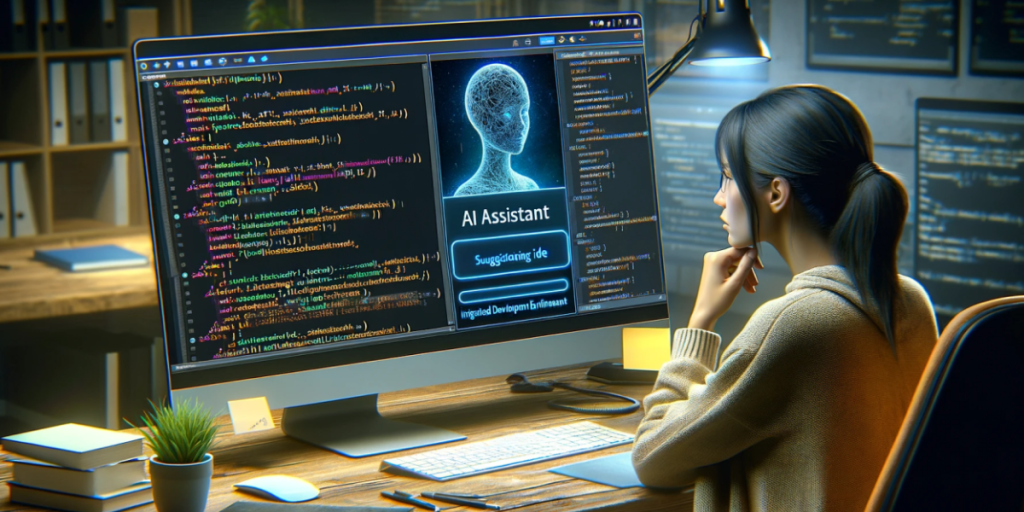Artificial Intelligence (AI) is altering the business landscape across every industry. Certain commentators believe that using neural networks is as significant as the advent of the internet. AI will change each sector, impacting every industry, and accelerate each technological innovation. Experts have expressed worries about how human lives could be affected, as well as the effect of AI on humans. However, there is no doubt that AI In Life Sciences will help save many lives and lessen the suffering of patients. Artificial intelligence (AI) ‘s effect on life sciences is seen.
Thanks to AI’s advancement, the development and discovery of drugs are being speeded up, clinical trials are becoming more effective, and personalized medical treatment is becoming the practice norm. This isn’t a near future but is taking place now, thanks to AI-powered technology revolutionizing various aspects of the life sciences. Many life science firms are currently leveraging the potential of AI to create medical breakthroughs, and each application is getting more interesting over the last. It has been noticed that our partners are searching for people with previous experience with AI to help their innovative initiatives, which puts these professionals in high demand.
In this post, we’ve listed the most effective ways that artificial intelligence is revolutionizing the field of life sciences.
Top AI Use Cases In Life Science
The effect of Generative AI In Life Sciences is only the start. Let’s look at the implications and AI application cases for life sciences by 2024.
Drug Discovery
It is essential to discover new drugs as it enables us to create new treatments and medications that improve the lives of those suffering from various ailments. AI can aid in identifying new drug candidates and predict their effectiveness and security. Compared to conventional discovery techniques, it is more straightforward, which means that firms could bring medicines to market more quickly and efficiently. This requires AI algorithms that analyze vast volumes of information to determine substances likely to develop into pharmaceuticals. This could include a search of databases of compounds already in use and natural compounds, in addition to using AI to create new compounds.
Medical Device Design
The design of efficient medical devices can be a complicated process that demands an attentive consideration of many factors, including material, shape, and dimensions. The traditional approach involved extensive testing and trial, leading to a lengthy and expensive development process. However, AI can help solve these issues by enhancing the development and manufacturing of medical equipment. Through machine learning techniques, AI can analyze large amounts of data to determine the most efficient material dimensions, shapes, and forms to fit a particular device, which allows developers to make more educated decisions.
Furthermore, AI can assist in creating virtual prototypes for medical devices. It will enable designers to evaluate and improve concepts in a virtual environment, reducing the time and expense needed to build physical prototypes. Utilizing AI to enhance the design of the layout, businesses can speed up the process of developing medical devices, reduce the cost of development, and get better products to go to market more quickly.
Drug Development
Artificial Intelligence (AI) is set to transform drug development within the life sciences industry, dramatically speeding up the process while increasing the overall efficacy. With the help of integrating vast quantities of information from diverse sources like the proteomics and genomics fields, as well as clinical tests, AI algorithms can swiftly determine potential drug candidates and speed up the testing of targets. Furthermore, AI-powered tools can predict the efficacy of drugs in terms of safety, effectiveness, and adverse effects. This dramatically reduces the time needed for the clinical and preclinical phases.
AI’s use in AI in the development of drugs promotes precision medicine, allowing the development of specific therapies that are specific to certain populations of patients. However, this raises questions concerning the confidentiality of information, ethics, and regulatory issues that must be tackled equally. In the end, adopting AI Applications In Life Sciences in the development of drugs has the potential to transform the field of life sciences by speeding up new therapy processes from laboratory to market. It also has the possibility of significantly cutting costs while improving the outcomes of patients.
Clinical Trials
Artificial Intelligence (AI) is revolutionizing clinical trials within the healthcare industry by enabling quicker, more effective, efficient, and precise processes. With the help of vast amounts of data, AI aids researchers in creating and conducting clinical studies and identifying the most suitable target groups and potentials. AI also assists in attracting and keeping patients by providing pertinent and personalized details to the participants.
Furthermore, AI-driven automation improves the monitoring of real-time adverse events and data analysis, ensuring safety and improving decisions throughout the trial process. However, issues such as privacy, data security, regulatory compliance, and ethical issues need to be addressed to maximize AI’s potential for clinical studies. In the end, finding the right balance between AI’s possible positives and drawbacks plays an essential role in shaping the future of clinical research within healthcare.
Suggesting Personalized Treatments
Artificial Intelligence is changing the treatment methods to customize with medical sciences. It delves into the medical records, weighing various factors that help physicians discover better treatments. In addition, AI tools can quickly and efficiently analyze complicated medical records like history pictures, tests, and other information. This helps physicians respond promptly to patient’s needs and give individualized medical care.
Automating Process
AI helps detect side effects by analyzing diverse patient information and enhancing the safety of international clinical trials. AI employs cutting-edge technologies such as NLP and computer vision to detect potential adverse reactions immediately. Research team gets an alert at every discovery of adverse reactions. It is helpful to take action promptly to prevent health issues and help save money.
Biomarker Identification
The process of identifying biomarkers is identifying a biological marker that helps to diagnose, forecast an illness, or track its progress or medication in medicine. AI helps to detect biomarkers by analyzing medical and biochemical data from patients and finding patterns and relationships that could appear too complicated for us to discern. Artificial neural networks (ANNs) can be trained with data to recognize specific biomarkers associated with particular conditions or illnesses. This could be utilized for more accurate screening tests and targeted treatments.
Chatbots And Virtual Assistants
Chatbots powered by AI have a variety of applications for companies in the life sciences. It includes providing support to customers in streamlining the recruiting process to conduct clinical trials and functioning as virtual assistants to medical professionals. Also creating leads, offering personalized product suggestions, and assisting in data analysis that can help inform company decisions. Chatbots can increase customer satisfaction and engagement, increase efficiency red, reduce costs, and offer valuable information to improve general business performance.
Electronic Health Record (EHR) Analysis
Electronic Health Records (EHRs) are digital copies of medical records. It allows healthcare professionals to quickly access patients’ records while giving patients a more significant role in managing their care. Artificial intelligence can assist EHR analysis by employing algorithms that detect patterns or trends otherwise hidden from humans. This information can improve patient care and outcomes by allowing health professionals to make better-informed choices about the best treatments and individualized plans. It can also help identify possible health risk factors before they develop into grave conditions, which allows for earlier intervention and preventative treatment.
Supply Chain Optimisation
The present challenges facing the pharmaceutical supply chain include problems like a need for more transparency, inadequate inventory management, and a fragmented distributed distribution network. These can result in delays in drug delivery and higher costs, which could impact the quality of patient care. AI helps enhance the process of supplying pharmaceuticals by predicting demand, managing inventories, and cutting down on waste. This can help ensure that surplus stocks are well-spent and reduce the risk of stockouts, which could result in delays in medical care.
Furthermore, AI can help address specific issues within the pharmaceutical supply chain, such as determining the most efficient shipping method to reduce transportation costs. It can also assist in detecting counterfeit drugs to block their access through the supply chain. Using AI techniques, pharmaceutical companies can increase the efficiency, accuracy, and security they can achieve in their supply chain activities and deliver better patient results.
Automated Recruitment Of Patients
Utilizing AI to streamline recruiting patients for clinical trials will significantly accelerate the process and increase trial participation. Deep Learning and Optical Character Recognition are used to analyze textual information extracted from medical records, use previous trials and potential candidates, and generate qualified questions using chatbots. Through the automation of patient recruitment, AI helps reduce the time and costs involved in the process and reduces the chance of bias during selection.
Drug Pricing
Pharmaceutical companies have several issues when it comes to establishing a price for drug plans, such as balancing the profitability of their products with affordability for healthcare systems and patients. The area of health economics is complex, and pharmaceutical companies must negotiate the regulations and price negotiations with the government and payers and take into account aspects like expenses for research and development along with production and demand for the product.
AI can predict the worth of medicine and establish the most effective pricing strategy by looking at vast quantities of data taken from various sources, such as studies in clinical trials, evidence from the real world, and trends in the market. Machine learning algorithms can detect patterns and relations in this information. This allows pharmaceutical companies to determine the benefit of drugs and their effect on the outcomes of patients.
AI can also simulate different pricing scenarios and anticipate the financial consequences. Allowing businesses to make data-driven decisions on pricing strategies. Armed with AI technology, pharmaceutical companies can tailor their prices to achieve profit and affordability while increasing patient access to lifesaving treatments.
Disease Diagnosis
It can be complicated because some illnesses are often diagnosed with symptoms identical to those of other ailments or exhibit subtle, nonspecific signs that are difficult to identify. Sometimes, the symptoms might only be apparent once the condition is advanced. Artificial Intelligence (AI) can aid in diagnosing difficult situations by looking at large quantities of medical records. It includes medical records of patients and laboratory findings, to spot specific patterns and detect abnormalities that might not be visible to human doctors. AI algorithms can also take the information they learn from and enhance their efficiency with time. Hence leading to more timely and accurate diagnoses.
Predictive Analytics
AI can identify a wide range of variables that affect the progression of disease and outcomes for patients. In particular, AI can help identify those likely to develop certain diseases or suffer adverse effects or complications while receiving treatment. AI can also predict the efficacy of certain treatment options for specific patients depending on variables such as their health history, genetics, and lifestyle. Furthermore, AI can help forecast disease progression over time, which can help inform the treatment plan and enable early intervention in some instances.
Ethical Considerations In Life Sciences AI
The current trends within the field of life sciences make clear that AI will play an essential role in the industry. It is a fact. While the possibility of AI in healthcare is immense and requires more research, it must also be unaffected by challenges, such as ethical concerns.
When artificial intelligence is incorporated into healthcare, many questions arise that concern data privacy and security. However, AI algorithms aren’t free of bias. They can amplify specific differences already existing in healthcare, such as those of racial or socioeconomic origin. When the data used in AI training is skewed in any way, such as favoring a particular race over another, the outcomes will be inherently biased.
What will the implications be? It could result in some groups being denied or ineffective treatment. Likewise, the overall accessibility to healthcare could be compromised. Some populations will receive more attention than others, while some will be disfavored. This highlights how crucial it is to build AI using a variety of real-world information sets that must be thoroughly checked before they are utilized. In addition, ongoing evaluation and ethical standards will ensure AI’s appropriate use in healthcare software creation.
Assuming their patients know how AI applications employ their data could be better. Neither can they take that patient to understand the consequences of sharing their data. Informed consent requires transparent and clear communications with patients that explain details of how their data is used, as well as the likely effects. In addition, patients should be given the choice to unsubscribe anytime. Patients’ limited understanding of how their personal data will be utilized creates questions about privacy concerns. Furthermore, the rapid growth of AI brings another issue into play, i.e., the end of informed consent. This is something that is yet to be addressed.
Implementing AI Life Sciences Challenges
The thousands of AI benefits to life sciences could revolutionize the sector. Still, many risk factors and challenges exist when implementing AI in healthcare and life sciences. It is also mandatory to deal with the risks of AI for life sciences. Hence to ensure that it can reach the full potential of AI.
Data Biases
To provide exact knowledge, an enormous amount of patient information is necessary in life science. It is possible to train AI models with data sets. This may result in biasedness. The result could be inaccurate outcomes that could adversely affect the patients. The companies must follow the top AI techniques in life sciences. They must also adopt the required procedures to make sure that the results are unbiased and provide accurate results.
Lack Of Skilled Workforce
One of the most challenging aspects of implementing AI in the life sciences is the need for more life sciences experts and AI specialists. This has acted as a barrier to progress within the life sciences. However, this issue can be solved by enhancing the skills of individuals already employed in the industry. Think about implementing training programs.
Regulatory Compliance
Compliance with regulations is paramount since the life sciences sector is governed by strict data privacy regulations. Businesses could face serious legal problems if they fail to adhere to these standards. Implementing AI in life sciences may increase the risk of regulatory compliance. However, companies can reduce the risk of complying by keeping up-to-date on the latest regulations and establishing a culture of respect for the rules within their company.
Data Privacy Concerns
The data in the life sciences, specifically medical records for patients, are very sensitive and subject to stringent privacy laws. However, Artificial Intelligence in life sciences may increase the privacy of patient data as well as security risks. Companies can tackle this problem by safeguarding the confidentiality of data utilized in AI applications. This will ensure patients’ confidence and compliance with laws.
Conclusion
AI is revolutionizing the field of life sciences by enabling diagnosis automation, speeding drug process development, enhancing clinical trials, etc. However, it is only the start of this revolutionary technology, which is rapidly changing the face of industry. As technology advances, AI technology is the future of the life sciences sector. AI could transform the field of life sciences by speeding up the process of developing and discovering drugs. Hence enhancing clinical trials, and facilitating the development of personalized medicine and precise healthcare.
Many AI Use Cases In Life Sciences show the enormous potential for this technology to improve patient outcomes. Hence resulting in reduce expenses, and speed up the diagnosis and treatment process. It’s likely to be one of AI’s most thrilling use cases.

























